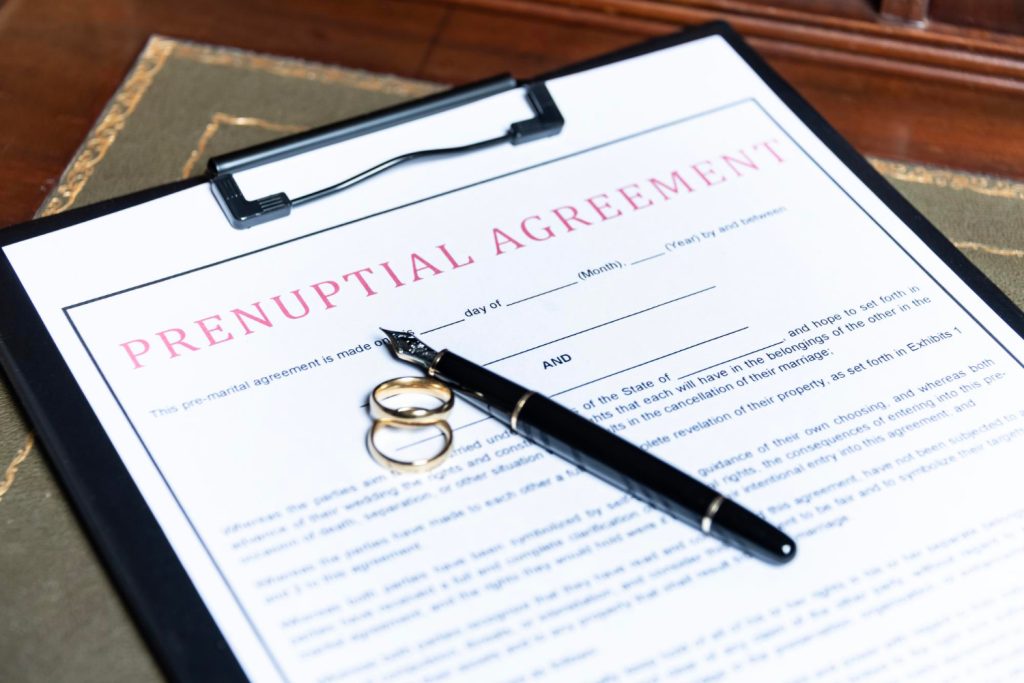When planning a wedding, the last thing most couples want to think about is the possibility of a future divorce. But at MenduniMartindill, we believe that a well-crafted prenuptial agreement can actually strengthen a marriage. It’s not just about protecting assets; it’s about setting clear expectations and showing mutual respect. Let me guide you on what to include in your prenup to ensure both peace of mind and a sound financial future.
Based on trusted sources, a prenuptial agreement should include property and debt division, spousal support terms, and any guidelines for financial responsibilities. It may also list what each person owns before marriage and how to handle assets after divorce. It’s also important to consider individual state laws.
Introduction to Prenuptial Agreements
A prenuptial agreement can safeguard individual assets and outline financial responsibilities, providing clarity and peace of mind before marriage.
A prenuptial agreement explains how a couple’s money and belongings will be split if they get divorced or if one of them dies. People often use prenups to keep their own property safe, especially things they had before they got married. This can help both partners feel more confident about their financial future.
Prenups can cover different topics like who gets what property, payments to a spouse after divorce, and who inherits what. It’s important for both partners to share all their financial details honestly when making a prenup. Courts will follow a prenup if it’s fair and both people agreed willingly. It’s a good idea to talk to a lawyer to make sure the prenup follows the law and looks out for both people’s interests.
Assets to Include in a Prenup
In a prenup, it’s interesting to note that you should consider including assets like property or investments owned before marriage, future inheritances, savings and retirement accounts, business ownerships, valuable personal items, and even debts or liabilities.
It’s important to be open about all your money and debts to protect both people in case of a divorce. If you clearly spell out the rules for handling these things, you can avoid future fights or confusion.
Getting help from a lawyer to write a prenup can make sure you cover all your assets and keep them safe. It’s also smart to check and update the prenup as your finances change. A good prenup can help both partners feel secure about their money and bring peace of mind to the relationship.
Debt and Financial Responsibilities
Debt is a financial obligation that has historically fueled economic growth and personal investment but must be managed responsibly to avoid long-term financial strain.
Borrowing money usually means you promise to pay it back, often with extra charges called interest. Managing money wisely involves paying off debts on time and saving for the future. If you don’t handle your financial responsibilities, you could harm your credit score, face legal trouble, and experience financial challenges.
It’s important to focus on your financial duties and create a budget to ensure you can cover your obligations. Don’t take on more debt than you can handle, and seek help if you’re having trouble managing your finances. By keeping an eye on your financial responsibilities and making smart choices, you can build a secure financial future for yourself and your family.
Alimony and Spousal Support
Alimony, also known as spousal support, can sometimes continue even after the recipient spouse remarries, depending on the terms of the divorce agreement.
Largely alimony helps both partners live a similar life after their divorce. A judge usually decides how much is paid and for how long. They look at things like how long the marriage lasted, each person’s income and job prospects, and any sacrifices one partner made for the other.
Spousal support is like alimony, but it’s paid while the couple is separated or before the divorce is final. In concise terms it’s meant to help a partner who depends financially on the other. The goal is to make sure both people can cover their expenses during the divorce process.
Both alimony and spousal support can be changed or stopped if things like income or job status change. It’s important to talk to a lawyer to understand your rights and responsibilities regarding these payments.
How to Update a Prenup
To update a prenup, both parties need to agree on changes, seek legal counsel, and sign the revised document.
It’s important to be clear and detailed when listing any updates, like new assets or changes in your situation. Check the prenup regularly to make sure it still matches both your wishes and finances.
Make sure any changes follow state laws so they’re legally binding. Get legal help if there’s any disagreement or confusion while updating it. Regular updates can keep the prenup useful and relevant throughout your marriage.

The Closing Remarks
A well-crafted prenuptial agreement should address financial assets, debts, property division, spousal support, and potential scenarios such as divorce or death.
What MenduniMartindill is urging you to look at is, it is important for both parties to openly discuss and negotiate terms that protect their individual interests and ensure a fair resolution in case of any unforeseen circumstances. A prenup can provide clarity and peace of mind for couples entering into marriage.
References
- “Prenuptial Agreements: How to Write a Fair & Lasting Contract” by Katherine Stoner, NOLO Press, Katherine Stoner
- “Prenuptial Agreements: How to Write a Fair & Lasting Contract” by Katherine Stoner, NOLO Press, Shae Irving
- “Prenuptial Agreements Line by Line: A Detailed Look at Prenuptial Agreements and How to Change Them to Meet Your Clients’ Needs” by Linda H. Edwards, ABA Publishing, Linda H. Edwards






